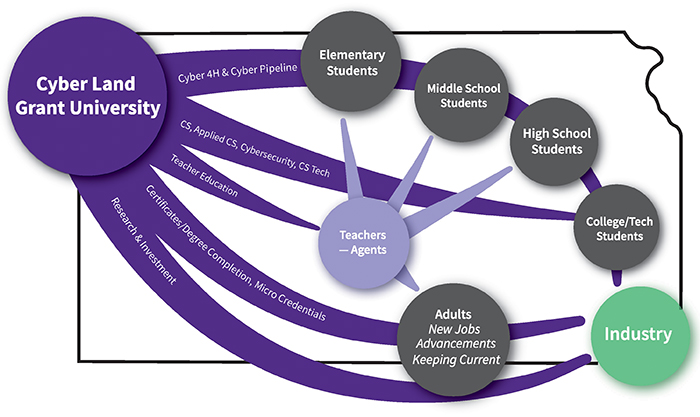Computer Science for All
The computational core initiative
By Mary Rankin

The Computational Core Initiative, or CCI, a set of computer programming courses offered by the computer science department in the Carl R. Ice College of Engineering, is designed to provide students of any major with the fundamental knowledge to utilize programming in a variety of situations.
“Programming is the skillset that makes students stand out in the 21st century job market,” said Scott DeLoach, professor and department head of computer science. “Using computers to solve problems is a key part of the modern, technology-driven workplace.”
The initiative includes high-quality, modular and scalable state-of-the-art courses. Employing a cutting-edge online education framework, students work at their own pace, but are required to master basic concepts before advancing. Immediate feedback and guidance is available through automated assistance as well as personal interaction with faculty and teaching assistants.
DeLoach and computer science instructor, Russell Feldhausen, began developing the CCI in spring 2018, building the open source online courses with Codio, a cloud-based platform that supports creation of integrated text, video and graphic course content with a built-in programming environment for carrying out programming assignments. The two, along with computer science instructors, Emily Alfs-Votipka and George LaVezzi, have written a textbook, recorded instructional videos and created online assignments automatically graded for each course.
The first five computational core courses form the computer science certificate program, which can be taken by itself or in conjunction with other K-State degree programs. Certificate courses include the following:
- CC 110 – Introduction to Computing
- CC 210 – Fundamental Computer Programming Concepts
- CC 310 – Data Structures and Algorithms
- CC 315 – Data Structures and Algorithms 2
- CC 410 – Advanced Programming
“The certificate course is essentially equivalent to a minor in computer science,” DeLoach said. “It teaches skills needed to solve real-world problems as students learn to develop their own software programs. Each course is available 100 percent online, allowing students to move through the program as quickly or as carefully as they’d like.”
The certificate requires minimal mathematical background, instead focusing on the application of programming. When completed, a student will have a strong knowledge of suitable programming skills for a variety of jobs.
“The original goal of the initiative,” DeLoach said, “was to integrate computer science classes into other degree programs on campus. Our computer science degree in the college is ABET-accredited, while the computer science certificate and other related degree programs are not. The CCI courses focus less on theory so college algebra is sufficient with no calculus required.”
The team currently has additional CCI courses in development as part of a planned B.S./B.A. degree in integrated computer science. These will cover more advanced topics such as web development, data science, system administration and database systems.
But the vision has expanded even further than additional advanced coursework.
“We basically want to provide a set of highly modular educational components that can be integrated into computer-related education from middle school through college, and even adult education,” DeLoach said.
The CCI is multifaceted in that it uses the same basic courses to make computer science available to non-computer science majors online, on campus and throughout the state at smaller colleges lacking resources or expertise to offer their own classes in this area.
The first courses will be taught at Manhattan Christian College in spring 2021 through the CCI Academic Partner Program, with plans to offer these at other small colleges throughout the region.
The CCI Cyber Pipeline program also offers CCI courses at high schools and is being piloted at Manhattan High School this fall with 18 students enrolled in the first course.
“This is a hybrid setup,” DeLoach said. “The students learn online but also have a teacher in their classroom to help when they have questions. Some of these kids have really taken off with it!
“Our vision is for computer science to be taught in all high schools in Kansas at no cost to the students. Right now we are projecting a $60 cost to school districts for each student in a course. Next year eight to 10 high schools across the state will be on board with possibly even a Missouri high school now that K-State is offering in-state tuition to Missouri residents.”
DeLoach also sees the possibility of the first CCI course being available in middle schools. Students will then take one of the four remaining classes each year of high school. A Spanish version of the CCI is being developed by Jorge Valenzuela, computer science teaching assistant professor, with plans to pilot it next year at a high school with a significant population of Spanish-speaking students.
“The Cyber Pipeline program is a recruiting tool for the college and university,” DeLoach said. “If someone were to take the CCI courses in high school, that person could enroll at K-State with 17 earned credit hours at almost no cost.”
Plans to integrate the program campus-wide include partnering with the College of Arts and Sciences to create a new bachelor’s degree in integrated computer science, designed for those who want computer coding skills but not an engineering degree. The proposed program will combine the CCI courses with preparation in a specialized content area within the arts, humanities, social science, hard-science or almost any degree area within the university.
“Arts and sciences is natural link,” DeLoach said, “as all research in the hard-sciences, sociology, psychology, etc. are predicated on data. Why not have the skills to gather, build and manipulate that data?”
The department is also collaborating with the College of Education on a professional development program for high school teachers to become certified to teach computer science.
The first bachelor’s degree program integrating CCI courses was launched this fall — the geographic information science and technology degree in the department of geography. Plans are also underway for a digital media bachelor’s degree within the department of journalism.
Looking to industry, DeLoach said the possibility exists for packaging and selling CCI courses to companies wanting to offer this certification and training to their employees.
The president and provost have expressed interest in the CCI becoming a key program for launching Kansas State University as the first cyber land-grant institution in the nation.
“We could become the ‘poster child’ of a cyber land-grant system,” DeLoach said, “one day educating and training all Kansas residents in computer-related technologies.”
